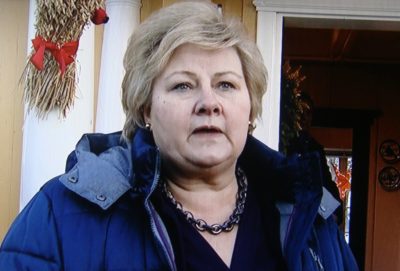As political chaos reigns among its closest allies in neighboring Sweden, the UK and the US, Norway finally seems close to getting a new government of its own. Prime Minister Erna Solberg’s three prospective government partners reportedly have all called in their top politicians to meetings on Thursday, to review a proposed platform for an expanded conservative government coalition that also, finally, would have a majority in Parliament.

State broadcaster NRK reported Wednesday morning that the central boards and Members of Parliament for the Progress Party, the Liberals and the Christian Democrats have been summoned to meetings at Gardermoen, just north of Oslo, Thursday afternoon. Progress and the Liberals are already members of Solberg’s coalition, while the Christian Democrats may join.
Both the Liberals and the Christian Democrats are deeply divided internally, however, and there’s no guarantee that any platform full of compromises for all parties involved will be accepted by their respective boards. The divided Liberals may even leave the coalition they joined just a year ago, if any major restrictions are to be included in Norway’s abortion law. The centrist Christian Democrats are still so split over whether to swing to the left or right side of Norwegian politics that powerful voices within the party are already calling on it to return to the opposition in Parliament, or form a coalition with the Labour and Center parties instead.
There’s also been strong disagreements within the Progress Party, which has been Solberg’s government partner since 2013. It’s right-wing faction thinks Progress has made too many compromises already, and highly vocal party officials claim they won’t accept any further backtracking on, for example, immigration, alcohol or tax policy.
Earlier meetings were delayed
Solberg leads the most unified party, the Conservatives, but she also has had to call in the party’s central board, government ministers and MPs. Board members, county chapter leaders and other top officials must review any new government platform proposal and approve it, like all the others.
Meetings were initially due to be held on Monday, but apparent ongoing disagreement among those negotiating in Hadeland for the past two weeks forced their cancellation. There reportedly were still too many conflicts over how many UN-certified refugees should be allowed into Norway in the future and over how many other asylum seekers should be allowed to remain in Norway.
If meetings on Thursday now go as planned, the parties will separately read through a proposed platform. Its contents will only be revealed publicly until after that round is completed.
No agreement at any price
Solberg, nearing the middle of her second term in office, has deemed the entire demanding process worthwhile, since it could result in her leading a majority government for the first time. It’s been important for her to keep the Christian Democrats on her side. Even though they only won 4.2 percent of the vote at the last election in 2017, it was enough to give them the powerful swing vote on almost every issue coming before Parliament. The Christian Democrats are therefore in a position to make demands that in themselves have set off controversy since they represent so few voters.
All the parties claim they won’t agree to an expanded coalition at any price. Political commentators have also claimed that there seems to be a lack of enthusiasm around Solberg’s government project, both among the four parties themselves and the voters. Solberg believes cooperation is a goal in itself, but it’s not easy meshing four sets of policies on everything from abortion to drug addiction treatment to family funding and agriculture. Negotiations reportedly have been tedious, with a result now expected by the end of the week.
PS: News was also breaking Wednesday morning that Norway’s neighbouring Sweden may finally get a new government in place, more than four months after its national election. NRK reported that it’s likely to continue to be led by the leader of the Swedish Labour Party (Socialdemokraterna), Stefan Löfven, meaning he’d remain Sweden’s prime minister in the most conservative Labour-led government ever.
Chaos continues in the UK after its Parliament firmly voted down Conservative Prime Minister Theresa May’s proposal for leaving the EU. Brexit thus continues to cause great concern and uncertainty in Norway as well, since the UK is such an important trading partner. Thousands of Norwegians also live or study in London, while many British live and work in Norway as well, adding to the uncertainty even though Solberg and May have agreed that existing agreements regarding residence and rights would continue.
Norway is also is deeply concerned over political chaos and uncertainty in the US, where the federal government is caught in a shutdown. Norway’s government thus needs to deal with troubled allies while sorting out its own future as well.
newsinenglish.no/Nina Berglund

